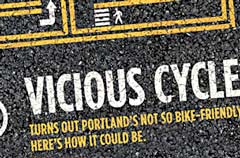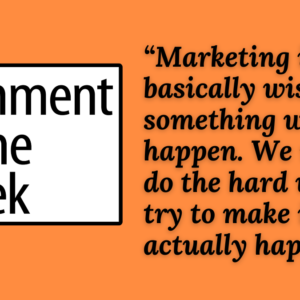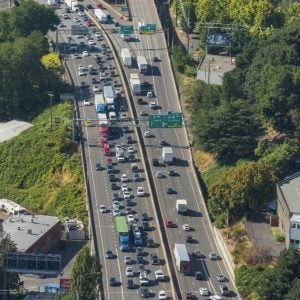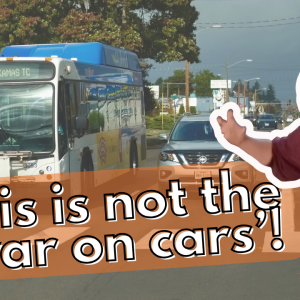
Local media outlets continue to be interested in the topic of bike safety.
The latest to chime in is the Willamette Week. In this week’s issue, they devote their cover and nine pages to a story by Corey Pein titled, “Vicious Cycle: Turns out Portland’s not so bike-friendly. Here’s how it could be.”
After an opening salvo that includes PDOT bike coordinator Mia Birk likening the lack of funding for bike programs to affirmative action, “The cars already get the best of everything, sort of like rich white guys,” Pein then details “14 ways that Portland could really live the dream of bike equality.”
Here’s his list:
- Separated bike lanes
- Slow down
- Bike boulevards
- Better signals
- Go blue [as in use more paint in lanes]
- Truck fixes
- Bike boxes
- No right on red [where bike boxes are installed]
- Close some streets to cars
- New trails and routes
- Helmets for grownups
- Bust bad bikers
- Driver’s ed
- Riders’ licenses
The article ends by coming to a not-so-shocking conclusion:
“The best thing Portland could do to increase safety for the growing ranks of cyclists—not to mention everyone else on the roads—would be to have more cyclists around.”
Couldn’t have said that better myself.
Check out the entire article on WWeek.com (there are also some good comments coming in already).
[NOTE: Stay tuned for an in-depth article on Portland’s new bike infrastructure plans from PDOT bike coordinator Roger Geller.]







Thanks for reading.
BikePortland has served this community with independent community journalism since 2005. We rely on subscriptions from readers like you to survive. Your financial support is vital in keeping this valuable resource alive and well.
Please subscribe today to strengthen and expand our work.
The Willamette Week is jumping on the bandwagon a little late and what they\’ve got to say, as usual, is mostly crap.
Where they should have started was by explaining to motorists exactly how wrong Lt. Krugers oversimplifications of ORS 814.420 and 814.430 are. Because in reality it is the exceptions to these two rules that keep cyclists safe, not a statement of the general case.
Then they should have questioned why at the very least the two truck drivers weren\’t cited for vehicular manslaughter.
Finally, they are all over the paint and path \’solutions\’. Paint stripes do not keep cyclists safe, as has clearly been demonstrated twice this month in Portland. As someone mentioned in the comments on the WW site, where\’s the public education campaign???
Most of their so-called improvements for cyclists are just more of the same – pandering to the terminally politically correct and motorists – their core readers.
They are ideas and suggestions. Thats all. Some are better than others. Some won\’t make any real difference. We are responsible for our own safety and our own actions, whether we walk, ride or drive. Simple as that!
I just returned from five weeks in Europe. I rode my bike almost every day, in the countryside and in big cities. No bike lanes, paint, boulevards, or (gasp) licenses. Never once did I feel unsafe or get cut off due to one simple fact – motorists over there are simply more aware and treat driving as serious business. How do we fix that here?
At least the local media is talking about the issues and taking the side of cyclist safety rather than painting us all as scofflaws and cranks as they have in the past.
Poster #2 is right: Ultimately we are responsible for our own safety. No street markings, tough laws, or education will truly protect you from the inattentive, drunk, or careless driver. Tragedies will still happen.
By the way, cars and trucks are not going away and to think so is a foolish dream. When gas gets more expensive, people will buy hybrids or use alternate fuels. They will buy electric plug in cars when gas prices get outrageous and in another decade we will see fuel cell and hydrogen powered motor vehicles on the roads. The cars will get cleaner but bad drivers will still be out there driving them. We will still need to share the road and that puts much of the onus for rider safety on the rider\’s shoulders. The only variable that you can truly control is yourself.
i\’ve recently realized that my experiences on the road tend to be safer when i\’m riding in groups of friends.
therefore, i\’ve hired 20 people to ride with me at all times.
it will be like those verizon commercials.
Great article Corey.
I\’m really happy to see that instead of dragging out the endless, somewhat counterproductive \”cars versus bike\” debate that has been dragging everybody down as of late, including the media, you chose instead to focus on something positive and productive in your article, namely highlighting some potential solutions and tools to help make out roadways safer for bicycles.
I was particularly pleased to see you giving some attention in the article to the bike box at Clinton & 39th. The first page of the Willamette Week states the paper has a circulation of 90,000.
Hopefully, that\’s 90,000 more folks (many, many of whom are motorists)who now know what that box is for, and now hopefully know how they should be using it accordingly.
The Willamette Week is clearly on the side of segregating cyclists and making them all wear special uniforms.
I barely saw one suggestion in that article as to how motorists and cyclists can work together to coexist better and safer on our shared roads.
The basic message in Portland for the last 20 years seems to be that motorists and cyclists can\’t coexist, and need to be physically separated at all times. There are a good number of people both inside and out of government that continue to work towards this goal.
I think that\’s just plain wrong, and that both the goals and the message need to change.
Motorist education is step one in this process.
http://www.sfbike.org/?coexist
14. Riders’ licenses?
Seems to me that would just discourage potential cylists and result in fewer bikes on the road.
suggesting riders licenses is definately pandering to the motorists and people like Terry Parker, if you know who he is.
car people never learn.. sorry for the chime like this, but its really the people behind the cars that are the issue.
my 2cents
Joe
There are good and bad ideas here, just like anything else. I agree that the omly real solution to safety is separated bike lanes. I really do get why some folks feel it\’s the need to mix in with the motorists, personally I want to be a far away from the beasts as possible. Not cause I\’m scared but because the two modes don\’t play well together, plus it\’s just nicer to have your own place.
I REALLY like the # 2 suggestion: SLOW DOWN, that goes for all of us ( motorists and cyclists). What\’s the deal with the \”sport\” of city biking anyway? Got Lance?
Front cover, main storyline…WW sure blew a good chance to throw out some serious commentary on PDX and cyclists. How much more predictable and conservative is this rag gonna get??? Pretty weak story.
Jonathon Maus, the WW quoted you under #11 which advocates mandatory helmets for adults. Is this really your opinion?
I would have thought that the #1 item on the list should be \”stricter enforcement of our existing traffic laws\”. Portland could start tomorrow if the Mayor decided it was a priority.
They system is already in place and working. I\’d vote spending our limited tax money on more Police and support.
\”Jonathon Maus, the WW quoted you under #11 which advocates mandatory helmets for adults. Is this really your opinion?\”
I wondered when someone would point this out.
My quote is absolutely not saying that I want a mandatory helmet law for adults. But I did say that I have some concerns over how many folks I\’ve been seeing around town not wearing helmets these days.
This is a very multi-layered issue for me that is hard to convey in a soundbite or a comment like this but…
It\’s not that I feel biking is so dangerous that you could crash and hit your head at any time…. but I do feel strongly that having one on just seems to make sense. I don\’t think I\’ve ever fallen (outside of a racing environment) and hit my head since I was a kid (I was in several collisions!)… but throwing one on seems like a small price to pay even for the very small chance that it might save me from a life-altering or life-ending injury.
also, as a dad of two precious little girls, I err on the side of being a model for them… and I want them to wear helmets, so I wear mine.
and sometimes, when the media asks me loaded questions like this, I have to admit that I think beyond my personal stance and consider how what I say might impact the larger community … like I said, this is a longer conversation than I have the ability to convey right here right now.
thanks.
It\’s not that I feel biking is so dangerous that you could crash and hit your head at any time
The thing with helmets is you don\’t need one until you need one.
helmets for peds too then
Jonathon, the issue is multilayered for most thoughtful people. My son just turned 16, and suddenly I find the issue is very multi-layered.
I have had misleading quotes in the press too. Thanks for not mealy-mouthing the answer.
used the same cost-benefit analysis as Jonathon: So little cost for so much benefit.
Generally, lawmakers think in terms of cost-benefit analysis when deciding whether a law would benefit society. They weigh the burden (b) of adopting the regulation against the probably that a loss will occur (p) multiplied by the size of the loss (l). When b > pl, the law would cost more than it would save, so it would not be a good policy. But when b < pl, the law would save more than it would cost. All types of costs and benefits are included in an analysis. Human benefits and losses are given an economic value to compare with financial gains and losses. For example, if you have a traumatic brain injury, you and your family lose perhaps a lifetime of income you would have earned and you and perhaps your insurer have to pay enormous sums for both acute medical care and long-term care. Now, traumatic brain injuries are both far more likely, and far more severe, when a bike rider is in a collision and is not wearing a helmet. That\'s a fact. You can look that up yourself. Also, it\'s an illusion that you have such control over your environment that \"it won\'t happen to me.\" It can. It does. And it affects lots of people other than you. It\'s a huge loss. Despite the fact that the probably is relatively low, the loss is so large, that the \"pl\" term of the equation is pretty big. What\'s the burden? You have to pay $20 bucks and stop pretending your hair is so nice that you don\'t have to wear a helmet. b << pl So, I concluded that a helmet law for adults is a good idea... But far less important than other reforms for dealing with the current safety problems that plague cyclists in PDX and everywhere else in the US.
\”helmets for peds too then\”
The sheer mechanics make this a ridiculous argument. Try falling from a walking position in a way that that would simulate how you fall from a bike. You\’d practically have to be trying to do a flip or a cartwheel.
the argument, I believe is that cyclists need helmets to protect themselves from all the big bad cars. How would a pedestrian land if hit by a car? The one pedstrian I\’ve seen hit did both a flip and a cartwheel.
btw – more peds than cyclists are hit each year, resulting in injuries and death
The difference between a pedestrian and a cyclist is that a pedestrian is generally on the sidewalk, and slower, and a cyclist is generally on the roadway with other vehicles, and is faster.
Burr-
your argument is weak..and it becomes apparent you\’ve probably never taken a high speed fall from a bike…your head ALWAYS hit the ground.
I know, I\’ve taken several spills in Cat.3 road races..several broken trophies in my basement to prove the fact I\”m still here and have NO hospital bills…
p.s….I\’m aware your retort will be that my accidents did not involve a car..nevertheless, broken skulls are broken skulls…
quit fighting the message of self-protection and self-preservation…I\’m sure your family would not enjoy feeding your through a tube the rest of your life or cleaning the drool off your chest every few hours. THAT is the reality of choosing to ride on the road and not wearing a helmet. I work in a hospital…and telling me otherwise is pointless. TBI\’s are serious…no very few people actually comprehend that.
as for the WW add…I see it as a positive step towards a dialogue..saying they \”missed the boat\” is assinine…the bike safety meeting happened…what…a week ago? its hardly untimely….
its a vessel for delivering a message that needs to be put out there now and reaches a community who probably isn\’t watching the evening news every night..
saying that your head ALWAYS hits the ground is pretty weak too
Enough with the friggin bike licensing. Bicycle NEEDS to be accessible to ALL not just those who can afford a bike license.
And the (stereo)typical bad biker is not a hipster. It\’s Joe Normal, on a $99 mountain bike, riding against traffic.
I\’m tired of hearing about helmets too. They don\’t wear helmets in Copenhagen or Amsterdam. Why? because car drivers SEE cyclists, and you generally slam your head after being hit by a damn car.
Actually Jonathan was in the article twice: the quote and the photo. It looks to be one of Maus\’ stickers on the top tube of the bike.
Although helmet use is just one small part of the article, I guess we have to spend the first fifty comments on it. So, here\’s my take: when we have a city full of drivers\’ as good as those in Copenhagen, I\’ll be the first one to take my helmet off. Until then, I wear it!
Bravo Willamette Week for helping Portland gear-up to biking. A couple of additions: Cyclists need clean. Running Trimet buses on a measley 5% biodiesel does not help. As for funding I\’m all for a carbon tax.
I\’m tired of hearing about helmets too. They don\’t wear helmets in Copenhagen or Amsterdam. Why?
Because conditions are different there.
Hey, that\’s NOT my apostrophe! Blame the iPhone!
What\’s the difference, rixter? That people have a much harder time getting their license, take their driving more seriously, and actually pay attention to the road?
Lots of differences. Driver education is one. Also different streets– city centers in Europe were built with narrow streets before the automobile created a need for wide streets. This favors bicycle transport, and disfavors the automobile. Cyclists have their own infrastructure there. Flat terrain and short commutes mean more people ride, and with more people riding, cycling is safer. Cyclists tend to ride slower there, and tend to ride faster here. Etc.
There are a lot of reasons that Dutch cyclists have a greater margin of safety than American cyclists, and pointing out that they don\’t wear helmets, without also discussing the different cycling conditions, makes the helmet use comparison meaningless.
a.Ø
Your supposition is disappointing. Substitute tobacco into your argument and you will see why cigarettes were outlawed in 1964.
Insha\’Allah you will reach your know-it-all years. (45 for men, 50ish for women.) Then if you want to remain relevant, you will really have to examine what comes out of your mouth.
I don\’t think they wear helmets in Bejing or Bangkok either…
How many deaths/injuries would be prevented if drivers all had to wear helmets? What about slip \’n falls in the shower?
I have no idea whether helmets are more useful for drivers, or bathers, or pedestrians than they are for cyclists – but it would be nice to find out…
Quickest way to get people on bikes. Congestion taxation like what is done in London.
I don\’t think they wear helmets in Bejing or Bangkok either…
In some Asian countries, they don\’t wear steel-toed safety boots when working with heavy machinery, either, preferring to wear flip flops.
Come to think of it, they don\’t have any issues with lead paint, either.
and many US companies profit from the lack of safety and environmental regulations in the third world. oops, now we\’re really off topic. let\’s stick to why there is a mania for mandatory helmet use in the US, but not in comparable countries in Europe, shall we? I think it\’s about a desire to transfer responsibility, in this case, mostly among motorists.
You\’re still ignoring the very different cycling conditions in some European cities and the United States.
I\’ve been to Europe and ridden, not Amsterdam, but Paris, Barcelona and some smaller cities in France and Spain. It didn\’t seem so different to me.
Besides which, according to at least one bicycle law attorney, if a cyclist is involved in a collision with a motorist, there is no negligence on the cyclist\’s part for not wearing a helmet. And that would seem to negate your theory that American helmet use results from a conspiracy among motorists to escape liability.
And in fact, the elephant in the room is that it\’s always been the trauma doctors and nurses who have pushed hardest for helmet use.
I\’ve been to Europe and ridden, not Amsterdam, but Paris, Barcelona and some smaller cities in France and Spain. It didn\’t seem so different to me.
You can\’t possibly maintain, with a straight face, that Dutch cycle tracks, complete with their own signal light, \”don\’t seem so different to me.\”
In Paris and Barcelona I went on some bike tours in the city, no helmets, no waivers, no competency test, no lights for the night ride, just reflective vests, groups of 20 out in traffic through the streets of Paris, Versailles, and Barcelona.
Sure there was dense traffic and occassionally we got honked at, but there were no homicidal maniacs in motor vehicles who couldn\’t negotiate Right-of-Way around bikes.
In the US, motorist attitude, ineptitude and indifference is the number one challenge to making the streets safer for bicyclists.
No amount of helmet laws, bike boxes, or anything else proposed is going to make one whit of difference if we don\’t retrain our motorists. If the DMV and Driver\’s Ed starts with young motorists now, it might start to make a significant difference in 10 or 20 years.
PDOT or the BTA could step up with something like the SF coexist campaign, but I haven\’t heard that proposal from anyone yet.
how do you do italics?
One year I brought folding bikes to Barcelona. I was all geared up with a helmet, I used it once and left it in my luggage the rest of the time.
Burr, 46:
I\’ll PM you on BF with the code (I don\’t think it will work if I do it here).
I wear a helmet. I don\’t have a problem with other people not wearing helmets. I mean, as long as they are organ donors, I\’d actually encourage the people that I don\’t know to not wear helmets. And please don\’t take meth or drink tell you get to .383 BAC, or anything like that either, it does nasty things to your liver.
I do support busting bad bicyclist. Everyone has stories about how some bicyclist with no lights in the middle of the night, blew through a signal and scared some motorist that had a green light. And people like that give us all a bad name. I\’m not sure that bicyclist ed or licenses would fix that, the problem is that you\’d have to spend a lot of time trying to determine if people actually did have licenses/passed the class, instead of actually answer the question of: Are they riding safely. (It is kind of like requiring a specific type of braking device on a bike, instead of answering the question of, are they in control of the bicycle.)
One of the main, most valuable things the bicycle helmet does is pretty basic: it slows down the speed at which your brain slams against the inside of your scull when your head comes to a sudden stop. The really sudden stop is what can give you a concussion and worse. But don\’t take my word for it, read about it at helmets.org.
Those dutch bikes look slow to me..10-12 mph?. And that upright position… . If I rode one of those, maybe I wouldn\’t wear a helmet either.
WW\’s concluding suggestion is the key to a dramatic improvement in cycling as transportation conditions:
“The best thing Portland could do to increase safety for the growing ranks of cyclists—not to mention everyone else on the roads—would be to have more cyclists around.”
More cyclists around could be the final nail in the coffin for the idea that motor vehicle operators are king.